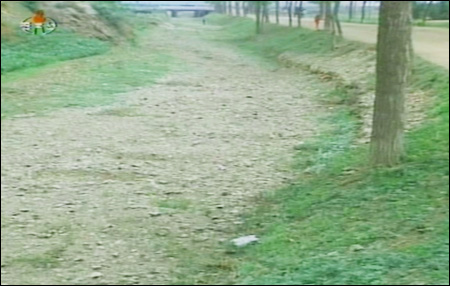Drought feared to worsen food shortages in N. Korea

A North Korean television program shows a dried up stream in western North Korea due to a prolonged drought in the area on June 14. A chief engineer in the area has commented that they are using well water to keep corn grown there alive. / Yonhap
Experts predict that the dry spell in North Korea will worsen food shortages by affecting cereal and vegetable crop production in the already poverty-stricken nation.
They said the corn that was planted between mid-April to early May will be one of the crops most severely affected by the lack of irrigation.
“North Korea will run into a big problem with this year’s corn harvest suffering from the severe drought,” said Kwon Tae-jin, a senior researcher at the Korea Rural Economic Institute (KREI). Kwon said that although the corn crops from the coming September harvest will not affect the current year’s food supply as they are a part of the following year’s provisions, it could lead to a price hike of other crops.
The Food and Agriculture Organization of the United Nations (FAO) predicted that “more than 3 million vulnerable people are estimated to face a food deficit as chronic food insecurity continues throughout the country,” in a report released on Monday.
The drought is also expected negatively affect yields of early cereal crops, potatoes, wheat and barley.
According to the FAO report, the dry spell has affected approximately 17 percent of the nation’s total area under main season cultivation of food crops, including parts of the largest crop producing provinces, North Hwanghae, South Hwanghae, North Pyongan, South Pyongan, and parts of Pyongyang.
FAO also reported the prolonged drought is taking place during the maturing age of crops when the need for water is high, and forecasted a lackluster harvest compared to previous years.
“Although the FAO and the World Food Programme (WTP) forecast North Korean crops will have lower yields compared to previous years at 500,000 tons, in reality I expect the numbers to be about 86,000 tons lower,” said Kwon.
The food shortages are a major concern for the North Korean government as it could lead to dissatisfaction with Kim Jong-un’s new rule. The young leader has emphasized the importance of food production on various occasions this year. A bad harvest and lack of provisions could harm his consolidation of power.
In light of the North Korean dry spell, foreign ministry spokesman Cho Byung-jae said there were no definite plans to aid the country at present. <The Korea Times/Kim Susan Se-jeong>



















































